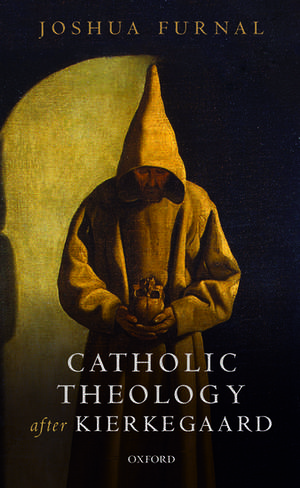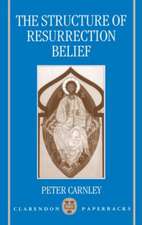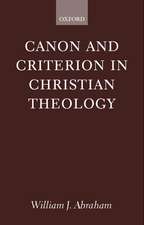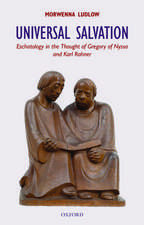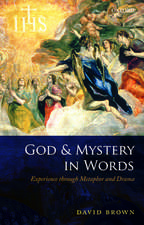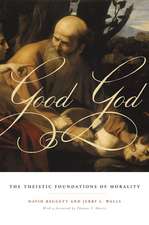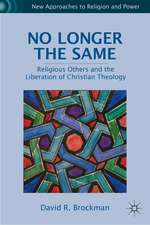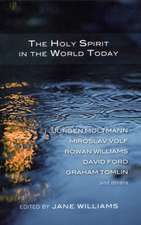Catholic Theology after Kierkegaard
Autor Joshua Furnalen Limba Engleză Hardback – 10 dec 2015
Preț: 772.30 lei
Preț vechi: 1112.03 lei
-31% Nou
Puncte Express: 1158
Preț estimativ în valută:
147.91€ • 152.39$ • 123.90£
147.91€ • 152.39$ • 123.90£
Carte tipărită la comandă
Livrare economică 13-19 februarie
Preluare comenzi: 021 569.72.76
Specificații
ISBN-13: 9780198754671
ISBN-10: 0198754671
Pagini: 272
Dimensiuni: 143 x 224 x 21 mm
Greutate: 0.44 kg
Editura: OUP OXFORD
Colecția OUP Oxford
Locul publicării:Oxford, United Kingdom
ISBN-10: 0198754671
Pagini: 272
Dimensiuni: 143 x 224 x 21 mm
Greutate: 0.44 kg
Editura: OUP OXFORD
Colecția OUP Oxford
Locul publicării:Oxford, United Kingdom
Recenzii
Catholic Theology After Kierkegaard is a revised dissertation, of the highest caliber. It is a model of thorough research, clarity of writing, and importance of thesis. The author, Joshua Furnal, demonstrates a deep knowledge of Kierkegaard's writings, and of the scholarship on him from the twentieth century up to the present, in English, German, French, and Italian.
Due to its nuanced argument and thorough research, this volume merits its place in the growing field of research on the Danish existentialist. While too advanced for new readers of Kierkegaard, this volume would be an excellent companion for any readers familiar with his works and ressourcement.
Søren Kierkegaard would not usually be considered a shaper of modern Roman Catholic theology. Yet this excellently researched and well-written study presents a convincing case that his importance to many of its key figures has been unjustly overlooked.
Furnal has done a real service in persuasively demonstrating the notable role Kierkegaard has in fact played within important lines of contemporary Catholic theology. Only time will tell as to whether his further ambition--namely, to encourage Catholic theologians to venture future constructive engagements with the Dane as an ecumenical resource--will be realised. But this fine study undoubtedly already represents a firm and welcome step in the pursuit of that hope.
[Furnal shows that Catholic] thinkers actually engaged with Kierkegaard, looking for ways he could be of help to Catholics seeking to rejuvenate theology, particularly those involved in the ressourcement, the attempt to get back to the early sources of Christian thinking. It is fascinating to see this engagement and recognize that Kierkegaard actually played a significant role in the theological renewal that made such an impact at Vatican II.
A model study in ecumenical and historical theology: historical, because its focus on key figures of the past shows they are not in fact past while their concerns live on; ecumenical, for Soren Kierkegaard has long been considered an emblematic 'Protestant' theologian while we see here how contemporary Catholic theology would be unthinkable without him And in the process, dialectical as well, as we are treated to often neglected thinkers like Erich Przywara and Erik Peterson, How deeply is Catholic ressourcement indebted to Soren Kierkegaard, and how deftly this work shows that!
... a book that will prove a landmark in both the study of Kierkegaard and of modern Catholic theology.
Overall, this book's combination of original research, creative thought, and clearly developed arguments make it a valuable scholarly contribution to both Kierkegaard studies and ressourcement theology.
[Furnal shows how Kierkegaard] not only lent weight to the 'new theology' endorsed by the decrees of Vatican II, but also, we might add, to ecumenical dialogues pursued by ARCIC [Furnal's work] is important, because it re-affirms SK's trans-denominational and trans-confessional significance.
Due to its nuanced argument and thorough research, this volume merits its place in the growing field of research on the Danish existentialist. While too advanced for new readers of Kierkegaard, this volume would be an excellent companion for any readers familiar with his works and ressourcement.
Søren Kierkegaard would not usually be considered a shaper of modern Roman Catholic theology. Yet this excellently researched and well-written study presents a convincing case that his importance to many of its key figures has been unjustly overlooked.
Furnal has done a real service in persuasively demonstrating the notable role Kierkegaard has in fact played within important lines of contemporary Catholic theology. Only time will tell as to whether his further ambition--namely, to encourage Catholic theologians to venture future constructive engagements with the Dane as an ecumenical resource--will be realised. But this fine study undoubtedly already represents a firm and welcome step in the pursuit of that hope.
[Furnal shows that Catholic] thinkers actually engaged with Kierkegaard, looking for ways he could be of help to Catholics seeking to rejuvenate theology, particularly those involved in the ressourcement, the attempt to get back to the early sources of Christian thinking. It is fascinating to see this engagement and recognize that Kierkegaard actually played a significant role in the theological renewal that made such an impact at Vatican II.
A model study in ecumenical and historical theology: historical, because its focus on key figures of the past shows they are not in fact past while their concerns live on; ecumenical, for Soren Kierkegaard has long been considered an emblematic 'Protestant' theologian while we see here how contemporary Catholic theology would be unthinkable without him And in the process, dialectical as well, as we are treated to often neglected thinkers like Erich Przywara and Erik Peterson, How deeply is Catholic ressourcement indebted to Soren Kierkegaard, and how deftly this work shows that!
... a book that will prove a landmark in both the study of Kierkegaard and of modern Catholic theology.
Overall, this book's combination of original research, creative thought, and clearly developed arguments make it a valuable scholarly contribution to both Kierkegaard studies and ressourcement theology.
[Furnal shows how Kierkegaard] not only lent weight to the 'new theology' endorsed by the decrees of Vatican II, but also, we might add, to ecumenical dialogues pursued by ARCIC [Furnal's work] is important, because it re-affirms SK's trans-denominational and trans-confessional significance.
Notă biografică
Joshua Furnal is Assistant Professor of Systematic Theology in the Faculty of Philosophy, Theology, and Religious Studies at Radboud University, the Netherlands. Previously, he was a Visiting Research Fellow with the Leslie Center for the Humanities and a Lecturer in the Department of Religion at Dartmouth College (USA), and a Postdoctoral Research Fellow at Durham University (UK) in the Department of Theology and Religion.
